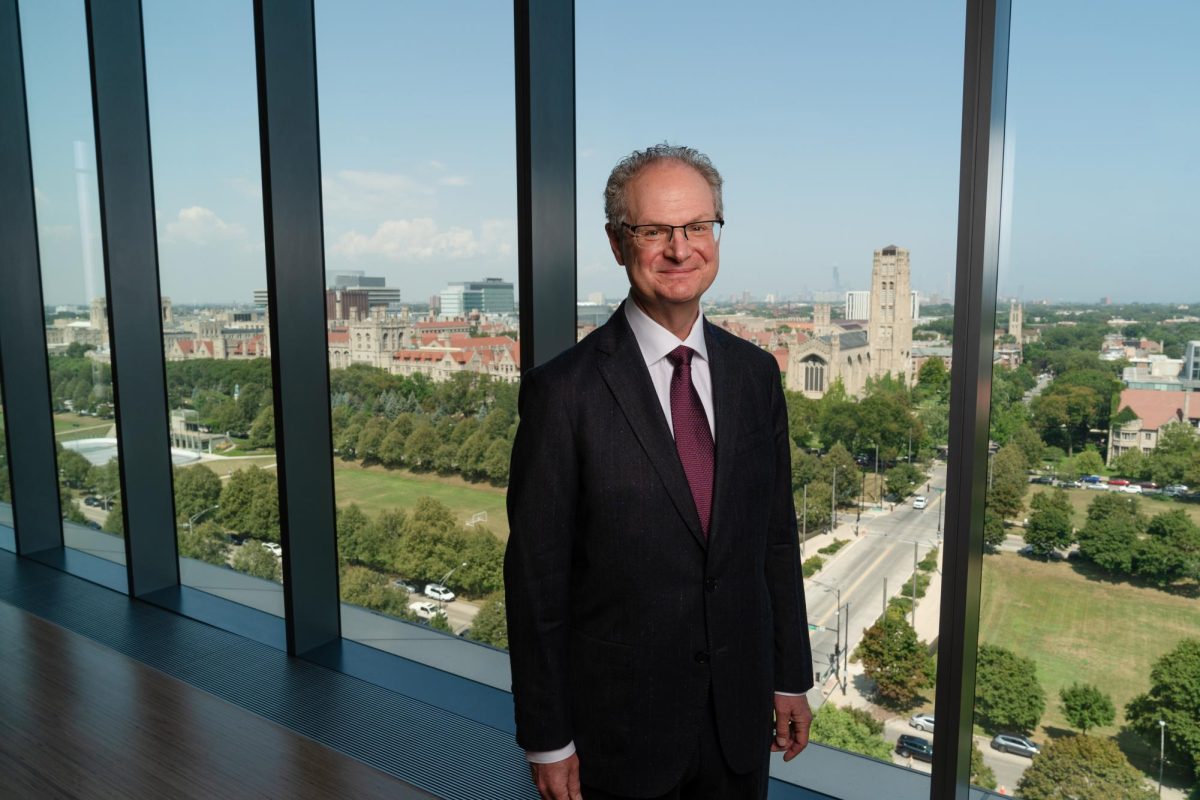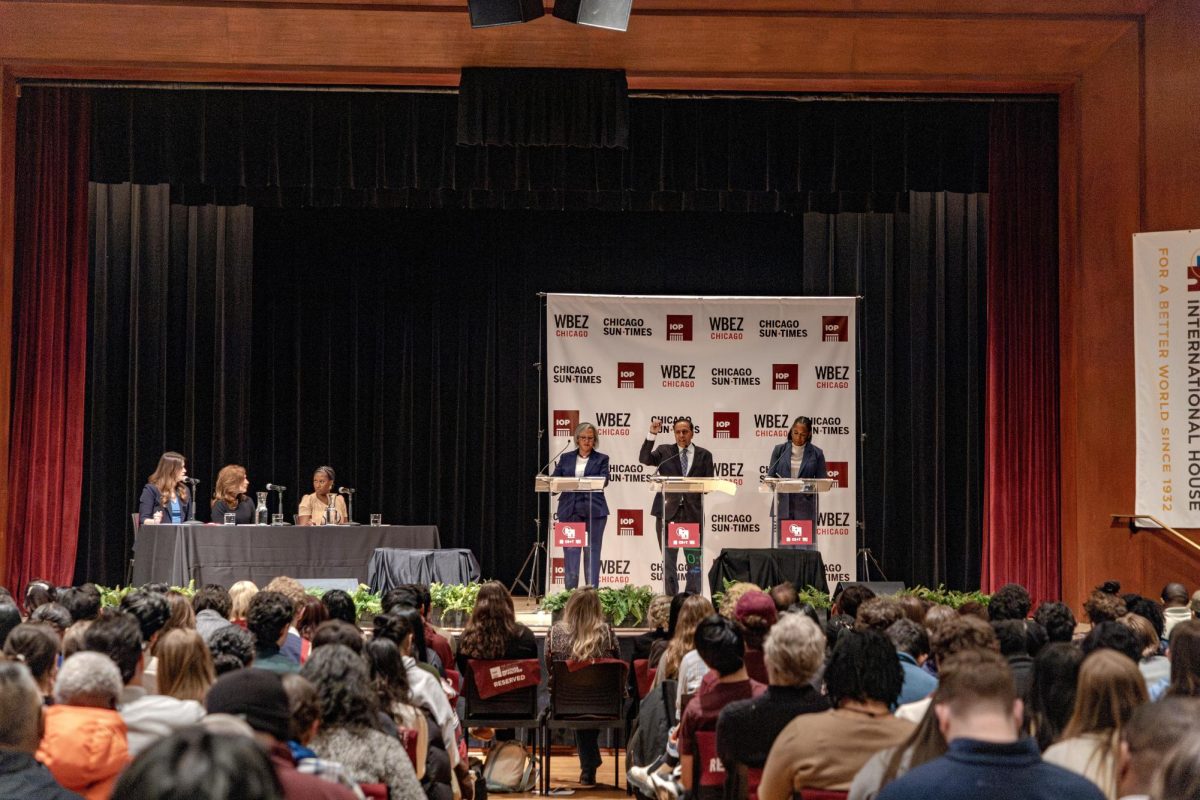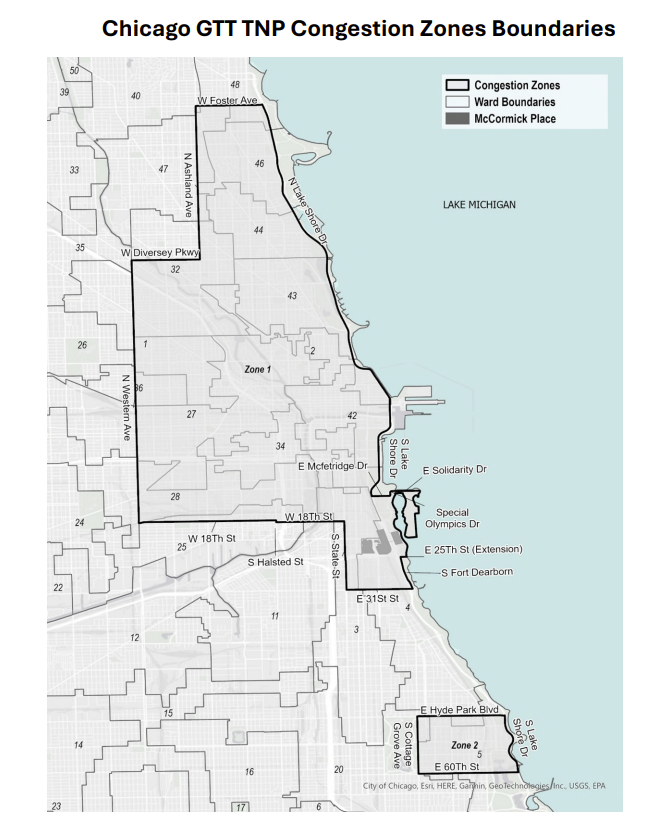Note: This interview was conducted before the Office of International Affairs reported that a UChicago international student was detained by federal agents on October 15.
Graduate Program Pauses and Spending Reduction Measures
As the University has looked to narrow its budget deficit—which totaled $288 million in fiscal year (FY) 2024—it announced this past summer that it would implement a series of budget cuts to reduce spending by $100 million over the next several years.
University President Paul Alivisatos said during an October 15 interview with the Maroon that the University is largely on track with its plan to reduce spending, based on the difference between FY2024 and unreleased FY2025 numbers.
“We’ll have reduced that structural budget deficit by more than 25 percent,” he said of the FY2025 numbers.
Provost Katherine Baicker said in May that a series of federal policy changes had made reaching that benchmark less realistic. However, the reduction aligns with the University’s original four-year plan to close the budget deficit by 2028, first announced in February 2024.
“But without any question, there are more risks than we [faced] before, so our sense was we really needed to secure the budget stability,” Alivisatos said.
Spending reduction efforts announced in September include reductions and pauses in the 2026–27 school year admissions for nearly 20 graduate programs, including most doctoral programs within the Division of the Arts & Humanities (AHD).
Graduate student and faculty unions have been critical of the pauses, arguing that the University has excused its financial troubles by framing them as a result of the Trump administration’s attacks on higher education instead of “decades of financial mismanagement,” as one graduate student put it at a recent rally protesting the spending cuts.
Alivisatos called doctoral education a “fundamental part” of the University, reframing the pauses as an opportunity to effect positive change and “take a student-centered perspective.”
“Independent of budget issues, it is really quite important at this time that the University engage deeply in trying to think through what should be the size of these programs,” Alivisatos said. “How do we organize them so that a much larger percentage of the students in them are engaged afterwards in the kind of cutting-edge research activities that that program[s] [are] designed to promote?”
“I think if you look at the statistics of how the outcomes go, [pauses are] a warranted thing to do,” he said. “Students enter into very long programs, and then the outcomes that they’re looking for in terms of careers have not materialized.”
A preexisting oversupply in Ph.D. graduates and a decline in tenure-track positions in academia persists as uncertainty around federal support for universities has led other institutions, such as Brown and Northwestern, to announce similar pauses, as well as staffing reductions.
Alivisatos said the 100 to 150 members of University staff estimated to be cut in the next few years, in addition to previous staff dismissals, would put the total at around 350 to 400 staff positions cut over a multi-year period.
“They’re amazing people, and the staff here truly love the University,” Alivisatos said. “So many decide to make their lives here, and they become a vital part of the University.”
He explained the University would focus less on voluntary retirement plans, which it has offered in the past, and other methods like holding salaries fixed to reduce staffing costs, in favor of establishing a review process for a “very large number of centers and institutes.”
“If we conclude that a center has served [its purpose] a lot for 30 years, but now really it’s not as much,” he said, “then maybe that will be a way in which we’ll achieve some reductions in staff.”
Restructuring Efforts in the Division of the Arts & Humanities and Other Divisions
Alivisatos also discussed the restructuring of the AHD, which may see its 15 departments consolidated into eight. Efforts of that kind, he said, are not new or unique to the University.
Dean of the AHD Deborah Nelson “has spoken frequently about the fact that there have been many efforts over a couple of decades—some going back more than 20 years, and some at national humanities organizations and others—asking the question, ‘[Are] the humanities organized right?’” Alivisatos said.
“The dean has been working with the faculty assiduously [on the AHD restructuring plans],” Alivisatos said. He also stressed that “every part of the University” is having “conversations about how to sharpen what they’re doing.”
Still, some faculty have called the possible restructuring a blow to the humanities and the University’s reputation as a champion of small, specialized departments. They have argued that the continuing existence of such programs is increasingly reliant on meeting standards of economic profitability.
“I am really deeply committed to the humanities—all of us are,” Alivisatos said. He said there are seven authorized tenure-track faculty searches this year in the AHD, a testament to that dedication. “That’s a lot of searches for one year.”
A spokesperson for the University told the Maroon that the seven approved faculty searches for the AHD this year were comparable to the number of searches in past years, and that across the University, searches would proceed to keep the number of tenure-track faculty steady.
Federal Attacks on Higher Education and Diversifying Funding for Research and Innovation
The University has faced additional pressure after the Trump administration significantly scaled back support for academic research beginning last January. Long-term losses in terminated grants amounted to between $40 and $45 million as of mid-May, Baicker told the Maroon last spring.
“I’m pleased to say that in the books that did just close on the last day of June, actually, our federal research funding was essentially flat,” Alivisatos said.
A spokesperson for the University confirmed to the Maroon that the amount of federal funding UChicago received in FY2025 did not substantially change from FY2024, but was less than the University had previously anticipated.
“There’s no question that the federal government has sponsored research that has been just utterly groundbreaking across the nation and absolutely at this University over the years,” he said. But recent years have brought more private sources of support and partnerships with foundations and companies, which allow for greater flexibility, he said.
Alivisatos pointed to the University partnering with IBM as an example of such support. UChicago also announced last May a $25 million collaboration with MFV Partners, a venture capital firm, to support new quantum computing, life sciences, and technology startups.
“The public good that comes from the kind of broad research that the science ecosystem is capable of has created enormous good for this country, and I’m hopeful that we’ll be able to keep that partnership going,” he said.
FY2025 was one of “record-breaking philanthropy for the University, by far the most in our history, which speaks to the support we have,” he said. “More than 50,000 gifts came in.”
Free Speech and Academic Freedom
In a speech at the beginning of Alivisatos’s tenure in 2021, he noted that democracy was facing threats both domestically and globally and argued that UChicago could be well positioned to work for the health of democracies.
Asked what he now saw as the University’s role in that work, Alivisatos described the University as an example to others with its philosophy of institutional neutrality, and its students as “bringing those values” across the world.
“The University doesn’t speak for faculty or for students, and that, I think, has allowed this place to… [host a large] variety of voices,” he said. “That’s another big contribution—our demonstrating that [that approach] works, and that it produces an environment where there’s civil discourse and serious thought, where protest is occurring all the time.”
“I feel keenly the responsibility to do everything I can every day to protect free expression inside this university,” Alivisatos said. “And, of course, we’re happy to talk with other [institutions] about the challenges that they’re facing.”
The government’s quickly reversed revocation of 10 UChicago student and alum visas last spring and a federal immigration crackdown that has landed Chicago in national news have also raised questions about whether the University could see a decrease in international student enrollment.
Alivisatos said that he has not observed such an impact. “I don’t think we had an example of somebody who wanted to come who wasn’t able to,” he said. “At least, I haven’t heard of it, and I’ve asked many times.” The Class of 2029, which submitted college applications before the immigration crackdown escalated, comprises students from roughly 100 countries, Alivisatos said.
“I’m deeply grateful and happy that that’s the case,” he said, adding that the issue has “a lot of personal dimension” for him as the son of Greek immigrants.
When asked what he thought UChicago’s responsibility to students outside the classroom to be, particularly concerning Immigration and Customs Enforcement (ICE) and potential National Guard activity in Chicago and Hyde Park, Alivisatos pointed to existing guidance but did not share specifics.
The University’s standing guidance to the community is to contact the University of Chicago Police Department (UCPD) in the case of any contact with non-UCPD law enforcement personnel, including ICE.
“I think it’s more prudent for me not to talk about what exactly we’re going to do under every circumstance, because there are all kinds of hypotheticals out there,” Alivisatos said. “But I will say, separately, you can get information about how the University approaches a situation where federal officers come onto campus. There is a protocol for that.”
Artificial Intelligence in the Core Curriculum
Looking ahead, Alivisatos said that as a chemist, he is excited about artificial intelligence and the change it will bring in his own and related fields.
“It’s really amazing what’s happening just in my own neck of the woods,” he said, expressing admiration for last year’s chemistry Nobel Prize winner John Jumper’s AI model AlphaFold2, which helps predict protein structure.
The University released a report in July with a series of recommendations on AI policy and teaching, including a workshop for first-year undergraduate students on ethics and methods of AI use, possibly administered through the Humanities Core sequence.
Alivisatos hopes that incorporating what he termed “computational thought” into the Core is part of how the University can both use AI tools and be involved in their creation.
He included computational thought in the ways of thinking that “an educated person” should have on hand and compared a student’s ability to recognize a beautiful book to “learn[ing] what a beautiful piece of computational thought is.”
“How we learn and how we think is in a period where there’s a lot of very exciting developments,” Alivisatos said. “So to me, it just seems vitally important that this university hold on to understanding that.”
He applied the approach of “sharpen” and “build” both to artificial intelligence research as it relates to pedagogy and to budget challenges.
“For the budget, ‘sharpen’ doesn’t mean you’re forsaking something,” he said. “Get it sharper. Build. Do those two things, and we’ll just be thriving.”
















Matthew G. Andersson, '96, Booth MBA / Oct 23, 2025 at 9:21 pm
Readers may wish to see the National Association of Scholars article, “UChicago’s Management Crisis,” 25 September.
JJ / Oct 23, 2025 at 5:43 pm
There is something almost operatic about the president’s capacity to speak at length while saying nothing. Every paragraph is a masterclass in euphemism (“student-centered pauses,” “sharpening,” “budget stability”)—the language of a CEO cosplaying as a philosopher. The humanities are collapsing. Doctoral education is being hollowed out. The entire D.E.I.-bureaucratic order is imploding. Amid this institutional reckoning, the man at the helm offers only the language of PowerPoint: optimize, reframe, leverage. No acknowledgment of his failings, no accountability, no sense.
One begins to suspect what is being “sharpened” is not the university’s mission, but the knife it is turning inward.
Garbage Man / Oct 27, 2025 at 2:30 am
Speaking of operatic, nice win at Eurovision.